Blokland van, Henricus Franciscus Theodorus Willem
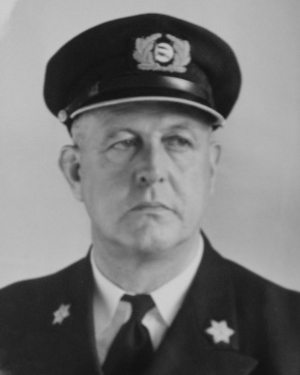
Captain van Blokland on a company photo taken in the late 50s. (e)
Van Blokland was born in the town of Weltevreden, part of the city of Batavia (capital of the Dutch East Indies) on 10 January 1896. Here his father was a captain in the Dutch East Indies Army (KNIL) for the Infantry.
His fathers full name was (*) Mr. Henricus Franciscus Theodorus van Blokland. The name of his mother was Hendrika Wilhelmina de Jongh. (a)
(*) He was deceased by the time Blokland Jr. was accepted at the Maritime Academy, hence the acceptance articles were signed by the mother. A contemporary newspaper reported that captain H.F.Th. van Blokland retired with full pension from the army on 02 March 1898.
He had been given in May 1893 a 2 year furlough to Europe due to illness. It was then announced that on 17 October 1901 captain van Blokland had passed away. Among the decorations was a 4th. class knighthood of the Military Willemsorde. (This is a Dutch decoration for outstanding bravery which is very seldom handed out. A 4th. class is normally the highest a regular military man can achieve.
Class 1: For Field Marshals, Admirals and Heads of State.
Class 2: For Generals in the field and Admirals at sea
Class 3: For those who already have nbr 4. and have reached the rank of General or Admiral.
So to get the M.W.O class 4, is not a mean feat.
(In Dutch the name “Van Blokland” indicates coming from a location called “Blokland”. There are two “Bloklands” in the Netherlands, a town north east of The Hague and a farming locality in the center of the Netherlands near the city of Utrecht. The name means “enclosed land”, e.g. land enclosed by a dyk.)
It is unclear yet of he had any brothers and sisters but the newspapers give a large numbers of “Bloklands” with similar initials from 1880 onwards until well in 1940’s who were all stationed in the Dutch East Indies.
The family at that time (1913) was living in the city of Arnhem (Van Lek/ Dekstraat 64). His mother remarried with Adriaan Antonie Walraven (born 02 Aug. 1867 at Terneuzen. ED: It will be interesting to find out eventually, if this gentleman was related to the Bastiaan Carolus Walraven who by that time was captain with Holland America. If so he might have been the inspiration for Blokland Jr. to go to sea and not to follow in his fathers foot steps. Still the army must have appealed to him somewhat as he was rated excellent in weaponry while at the maritime academy and also managed to rise to the rank of Lieutenant during his national service time which is un-usual for a sailor pushed into a land army situation, starting as a regular soldier.
He entered as Cadet into the “Kweekschool voor de Zeevaart in Amsterdam” on 17 September 1913. He followed the two year course which indicated that he had several years of secondary schooling, including mathematics and physics. Finished as number 40 of the 72 cadets of his year. His scores were sufficient but not outstanding except for “Weaponry” where he had the top marks of a 10 and a 9. (b)
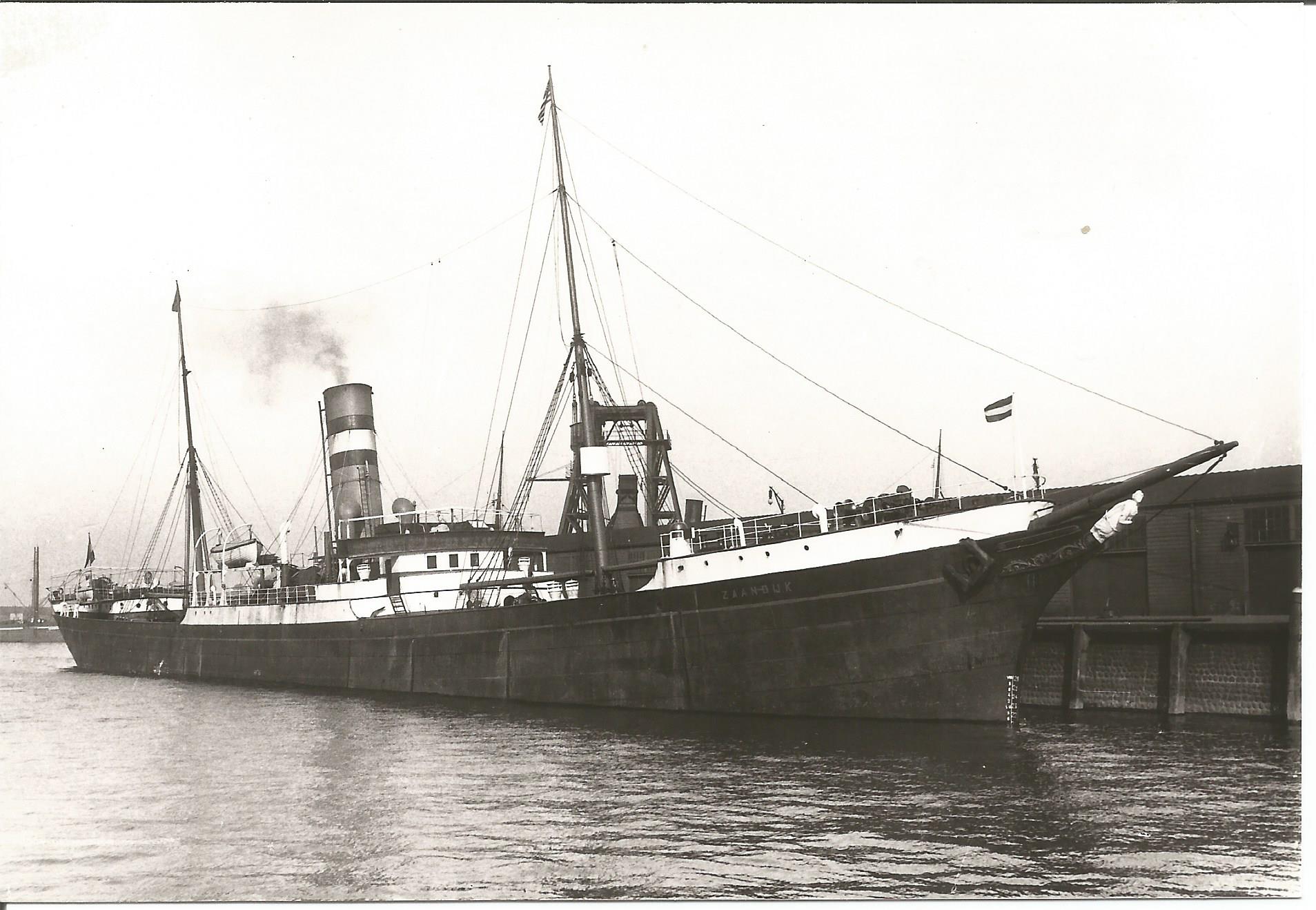
The ss Zaandijk (I) This ship built in 1899 and still looked very much like a sailing ship, which happened to have an engine in the middle. (e)
On 16 August 1915 he was placed as Cadet on board the ss Zaandijk (I) sailing from Rotterdam to North America. In October 1915 he transferred to the ss Westerdijk which ship was employed on the service Rotterdam – New York and North East American ports on a bi-monthly schedule. He returned to the school on 31 August 1916 and passed his 3rd mate license on 21 December 1916. He is then discharged from the academy on 31 December 1916 with good marks for skills, a good attest for his sailing year and excellent marks for behavior. (b)
His plans to rejoin Holland America are put on hold as he is called up for military service and reaches the rank of Lieutenant. Dismissed in 1919 he rejoined Holland America as 4th. officer and is placed on board the ss Gorredijk (I).
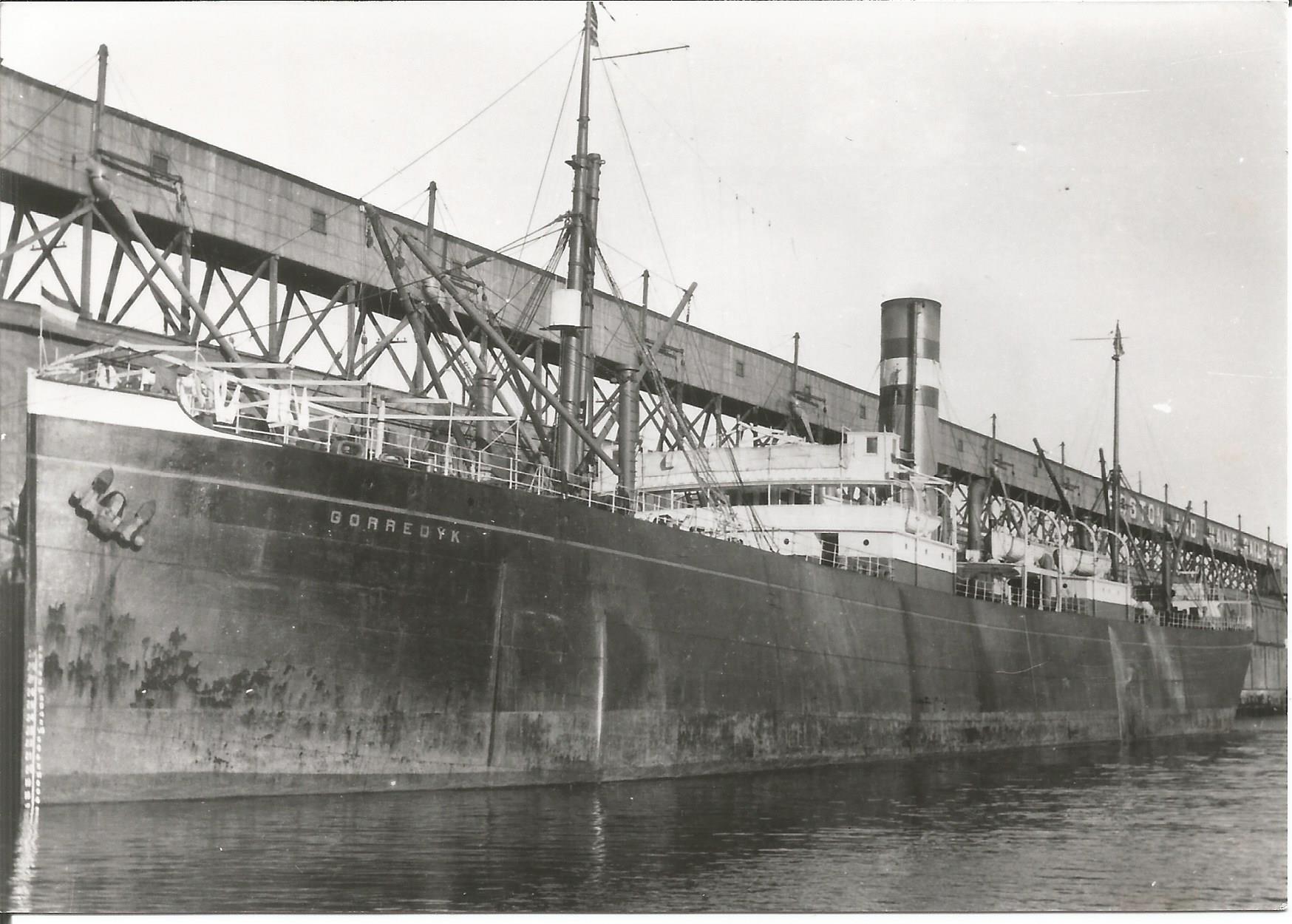
The ss Gorredyk (I) seen docked here in an American port loading grain. (e)
He is noted again to be in military service in the summer of 1924 as he kept his reserve officer status going. Eventually he would retire in ???? as reserve officer. Then shortly after on 22 January 1925, while at school studying for his first mates / captains license, he married Jacoba Helena Knuth (born 09 March 1906 at Amsterdam), daughter of Mr. Frans Jacob Heinrich Knuth and Geertruida Visser. At that moment they are noted to live at “Ginneken en Bavel”(**). This is a small municipality east of Breda in the province of North Brabant. The marriage is annulled on 28 August 1940. (Noted on 27 November 1940 in the Amsterdam registry). There were 3 children.
(**) Blokland Jr. is entered in the persons registration there from 01 January 1912.
So far I have only found the name of one daughter: Alice van Blokland.
During the depression he was one of the “lucky” officers for not being dismissed due to the reduction in personnel. The company had a policy to let go the youngest in each rank, who were either not married or did not have any children. By 1930 he was one of the senior officers in his 2nd rank group, plus he was married and had children. He just had to adjust to the fact that his wages were reduced with the depression getting more and more severe. Being senior is easy to see from his sailing list as he sailed for the duration of the depression on the passenger ships. But he was at once promoted to Chief Officer in 1936 when times were getting better and more company ships came back into service from layup.
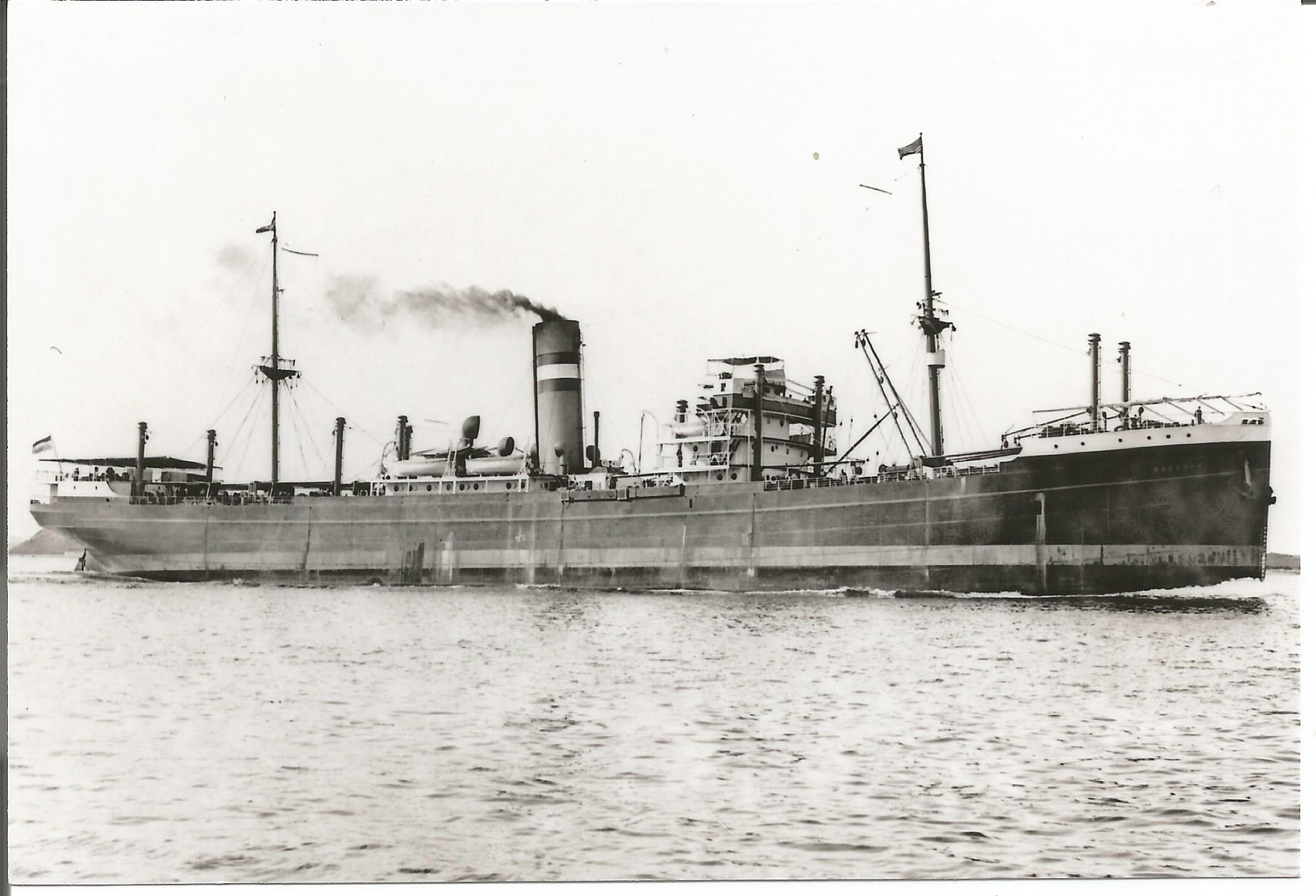
The ss Breedyk was one of a series of cargoships which came to Holland America between 1921 and 1923. This was the first ship on which Van Blokland was chief officer.
In 1939 he was called back for active service in the Dutch army due to the threat of war with Nazi Germany. Hence when The Netherlands had to caputilate due to the Rotterdam bombings, he was stuck in The Netherlands for the duration of the war. During the occupation he managed to avoid being deported to Germany in 1941 (which officially was ordered to all Dutch Military living in the Netherlands) by moving to Friesland and taking a job there with the help of false identity papers. Officially he was employed by the CDK = Central Distribution Office, which duties included inspecting whether nobody was hiding contraband and other goods that should have been reported to the Occupier. It gave an excellent chance to work for the Dutch Underground and thus ensure that only that was “reported” what was not of much use anyway. (e)
As Chief Officer van Blokland was stuck in the Netherlands he thus had the chance to remarry on 24 January 1941, at Rotterdam, Elisabeth Wilhelmina Hendrica Kelder (born 1900 in Amsterdam – passed away 1989) daughter of Jan Peter Kelder (company manager) and Elisabeth Wilhelmina Hendrica Witteveen. She was divorced from Melchior Dominicus Hendrikus Glansbeek. (a)
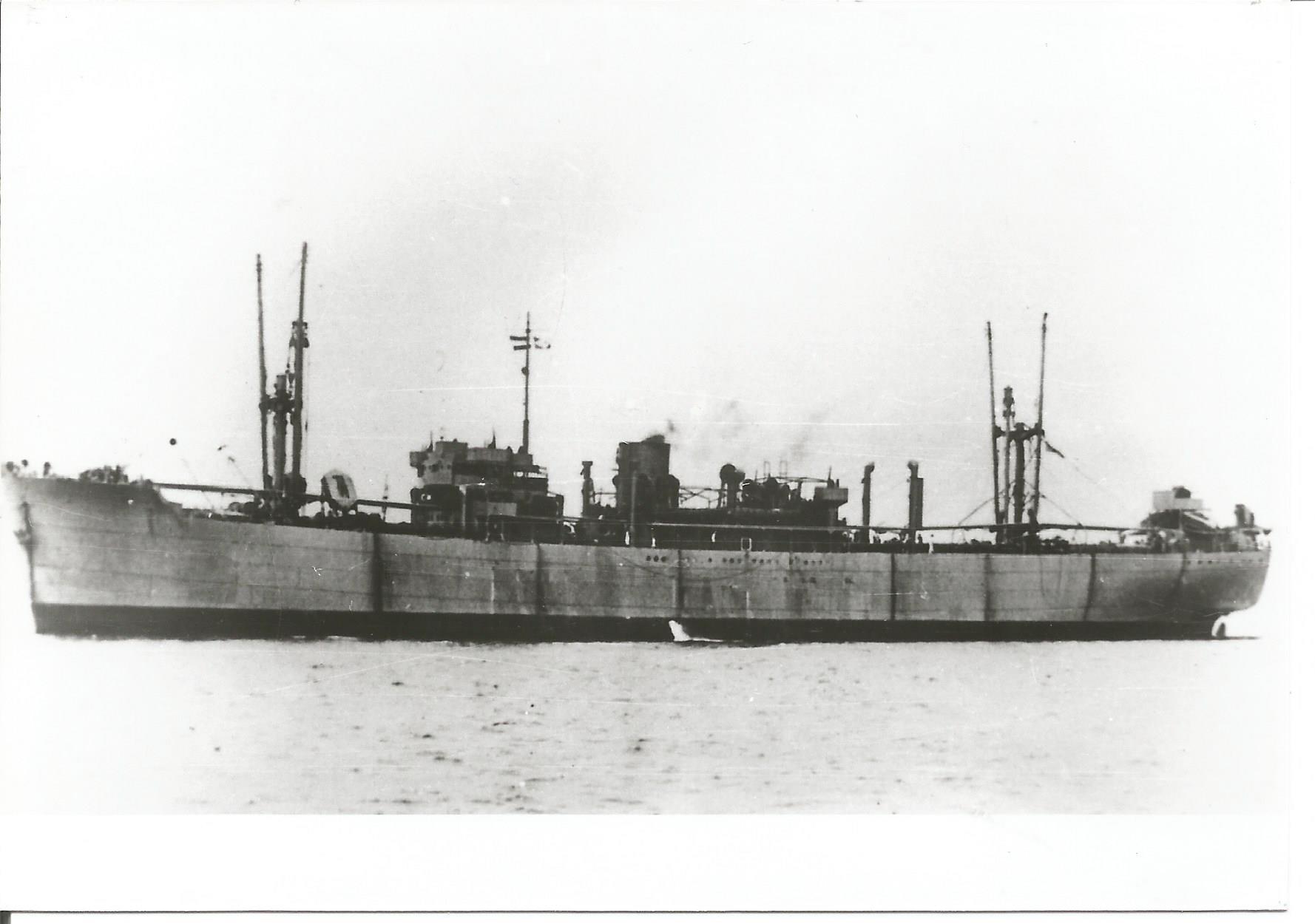
ss Philips Wouwermans was given in HAL management by the Dutch Government. The ship was named after a dutch painter.
With the war over, he reported back to Holland America and was at once promoted to captain of the ss Philips Wouwermans, a cargo ship owned by the Dutch Government but managed and crewed by Holland America. He made one voyage with the ship leaving on 05 August 1946 from Rotterdam and sailing to Montreal and then back to Rotterdam (arrival 26 August). This was the last voyage the ship made in HAL management. His was also a last minute appointment as for some reason Captain Gaart had to go home. Hence Captain van Blokland was already captain and away at sea before his promotion was made official on 16 August. While underway the ship was transferred to the “Netherland line” of Amsterdam and later renamed in ss “Ceram”.
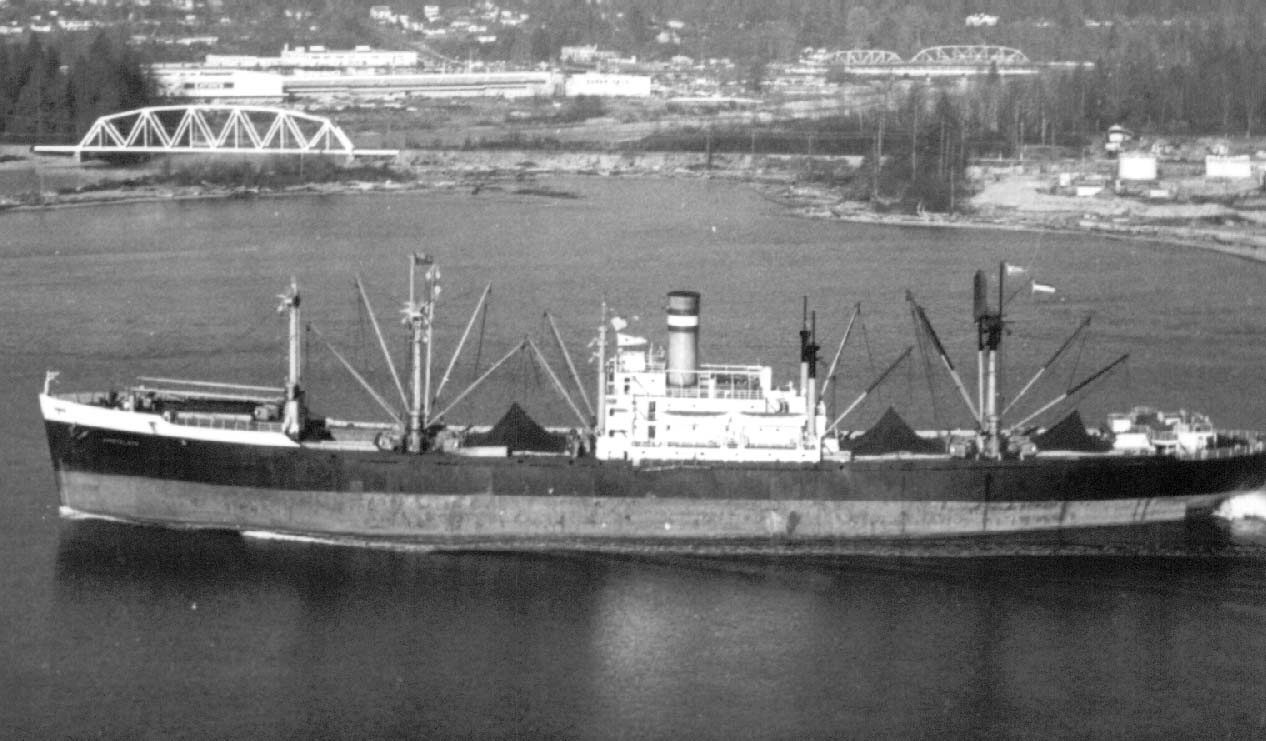
The ss Abbedyk departing from Vancouver.
The Holland America decided to buy a large number of USA surplus cargo ships to restart their cargo liner service. In total 13 of these ships were purchased and Captain Van Blokland was assigned to the ss Abbedyk, a victory class ship originally called the ss Milford Victory. For this he, with his crew, travelled to Seattle on the West coast of the USA and thus he leaves on 18th. of January 1947 with the ss Amsteldyk (II) from Rotterdam. Slowly but steadily all the crew arrive in the USA with various HAL ships, regroup in Seattle, and then the ship is handed over on 06 March at Todd Pacific Shipyard in Seattle. It entered service at once, loading cargo in Tacoma, Olympia, Billingham, Portland, San Francisco, Los Angeles, Cristobal (bunkers) and then sailed to London and Rotterdam for discharging; entering Rotterdam on 11 May 1947. After 11 days at home he then set sout again with the ss Abbedyk for the next voyage, this time going to the Gulf of Mexico.
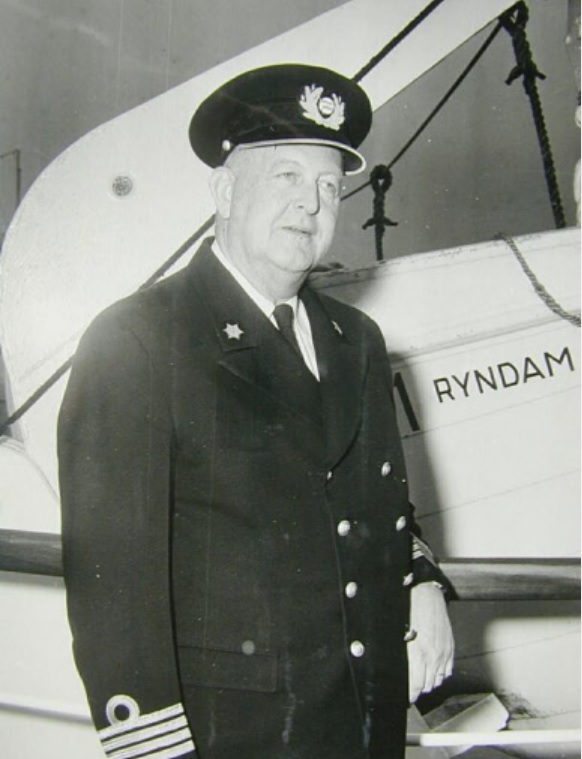
Captain Van Blokland on a press photo taken on board his last ship the ss Ryndam (II)
In 1953 he was captain onboard the ms Dongedyk. A short observation from one of his navigation officers from those days says that he was a large (***) and very quiet man, who seldom visited the bridge, except at 09.00, and 12.00 (When it was time for the noon position observations) and then again after dinner with the passengers, late in the evening. (d)
(***) The records of the Maritime academy indicate that he had a length of 188 cm., almost 6 feet 2 inches, which was very tall for those days.
Captain Blokland retired from Holland America on 20 January 1956 after the arrival of his last ship the ss Ryndam (II) in Rotterdam. In a newspaper article of 23 January1956 he said that given the chance he would take another job because he felt much too young to do nothing and also because his pension was much too small to live on.
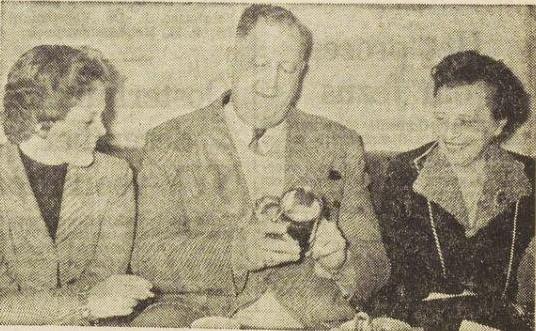
Captain van Blokland with wife and daugther, when they came to pick him up from his last ship on 20 January 1956
In Febr. 1957 the company offered him an official retirement party.
Captain H.F.T.W van Blokland passed away on 01 January 1970 at Dordrecht (hospital?) and was cremated at the Crematory at Ockenburg in The Hague. His last address Boterbloemstraat 7 Papendrecht. (a)
There was a remembrance announcement by his colleagues of the “International Cargo Inspection Bureau” (****) of Rotterdam, hence Captain Blokland did indeed take another job after his retirement. The HAL pension for those who retired shortly after the war was not very good. Some captains carried out coastal / relieve voyages on the HAL ships and others had some sort of job after retirement to complement their meager pension. (**** a “google” in newspapers and the internet did not provide any information what sort of company this was and if it is still exists)
Sailing List (a, f.)
Date: Function: Ship: Wages and/or remarks.
16 Aug. 1915 Cadet Zaandijk 20,–
14 Oct. 1915 Cadet Westerdijk 20,–
31 Aug. 1916 Temporary dismissed to go to school for 3rd mates license
21 Dec. 1916 Passed for 3rd mates license.
06 Feb. 1917 In military service. Achieves the rank of Lieutenant.
01 Aug. 1919 4th. Officer Gorredijk 100,–
01 Jan. 1920 Wage increase 110,–
28 Jun. 1921 3rd officer 125,–
Wage increase to 170,– starting 1 Jan. 1920
12 Jun.1921 Temporary ashore due to illness
15 Aug. 1921 3rd officer Maasdijk 170,–
01 Sept. 1921 Wage decrease 161.50
16 Oct. 1921 Wage decrease 153,–
17 Nov. 1921 Temporary ashore to go to school to study for 2nd mates license
23 Mar. 1922 Passed exam for 2nd mate
28 Mar. 1922 3rd officer ashore 140,–
07 Apr. 1922 3rd officer Amsteldijk 140,–
28 Apr. 1922 3rd officer Waaldijk 140,–
16 Aug. 1922 Temporary ashore
18 Sep. 1922 3rd officer Ijseldijk 140,–
06 Oct. 1922 3rd officer Moerdijk 140,–
07 Jul. 1923 Temporary shore
17 Aug. 1923 3rd officer Noorderdijk 140,–
16 Nov. 1923 3rd officer Moerdijk 140,–
29 Mar.1924 Act. 2nd officer Edam 210,–
24 May 1924 Act. Chief Officer Edam 285,–
15 Jun. 1924 Act. 2nd officer Edam 240,–
25 Jun. 1924 3rd officer ashore 140,–
14 Jul. 1924 In military service
03 Aug. 1924 Temporary ashore
11 Aug. 1924 3rd officer Veendam 140,–
17 Sep. 1924 Act. 2nd officer Ijseldijk 240,–
16 Dec. 1924 3rd officer Noordam 140,–
19 Dec. 1924 Temporary ashore to go to school to study for first mate
06 Jul. 1925 Passed for first mates certificate
07 Jul.1925 Temporary ashore
01 Sep.1925 3rd officer Binnendijk 140,–
09 Sep. 1925 2nd officer Zijldijk 240,–
27 May. 1926 Temporary ashore
14 Jun. 1926 2nd officer Breedijk 240,–
15 Jun. 1927 2nd officer Burgerdijk 240,–
25 Jul. 1927 2nd officer Noordam 210,–
08 Aug. 1927 in military service
29 Aug. 1927 2nd officer Ashore 210,–
01 Sep. 1927 2nd officer Gaasterdijk 210,–
01 Dec. 1927 2nd officer Rotterdam 210,–
12 Mar. 1929 Wage increase to 215,–
16 Jan. 1930 2nd officer Rotterdam 215,–
Senior on 2 April 1930, then 5 years 2nd officer.
Wage increase to 230,– starting 1 Jan. 1930
09 Apr. 1931 Temporary ashore 230,– due to scarlet fever at home
15 May. 1931 2nd officer Nieuw Amsterdam 230,–
05 Nov. 1931 Temporary ashore 230,–
12 Nov. 1931 Wage decrease to 208,–
And put on 70% standby money
04 Jan. 1932 2nd officer Veendam 208,–
08 May. 1932 Temporary Ashore 208,–
23 May. 1932 2nd officer Veendam 208,–
18 Sep. 1932 Temporary ashore 70% 208,– port watch
25 Sep.1932 2nd officer Breedijk 208,–
08 Oct.1932 2nd officer Veendam 208,–
23 Jun.1933 Wage decrease# with 5% in accordance with circulaire No 929 dated 27 june 1933
09 Jul.1933 2nd officer Veendam at 70% 208,–
23 Jul. 1933 Temporary ashore 208,– Regular leave
02 Aug. 1933 2nd Officer Veendam 70% 208,–
07 Aug. 1933 2nd officer Veendam 208,–
19 Oct. 1933 2nd Officer Veendam 70% 208,–
25 Oct. 1933 2nd Officer Delftdijk 208,– port watch
30 Oct. 1933 2nd officer Boschdijk 203,- port watch
12 Nov. 1933 Temporary ashore at 70% 208,–
15 Nov. 1933 2nd Officer Blommersdijk 208,– port watch
25 Nov. 1933 Temporary ashore at 70% 208,–
29 Nov. 1933 2nd Officer Statendam 208,–
05 Dec. 1933 2nd officer Dinteldijk 208,–
14 Dec. 1933 2nd officer Dinteldijk at 70% 208,–
28 Dec. 1933 Wage decrease to 187,20 see circ 929 dated 28 june 33
06 Jan. 1934 2nd Officer Dinteldijk 187,20
08 Jan. 1934 2nd officer Breedijk 187,20
07 May. 1934 2nd officer Veendam 187,20
01 Oct. 1934 Wage decrease to 181,–
28 Oct. 1934 Temporary ashore 181,– regular leave
02 Nov. 1934 2nd officer Veendam 181,–
19 Jan. 1935 2nd Officer Maasdam 181,–
04 Feb. 1935 2nd Officer Edam 181,–
25 Feb. 1935 2nd Officer Veendam 181,–
01 Oct. 1936 Temporary ashore 181,– Regular leave
19 Oct. 1936 Act. Chief Officer Breedijk 208,–
19 Jun. 1937 Temporary ashore 208,– regular leave
01 Oct. 1937 According to new regulation 238,25
17 Jul. 1937 Chief Officer Blommersdijk 208,–
GAP
TBA as here the company records in the archives stop. More information is held by the HAL Pension fund in Rotterdam but these records are not accessible for researchers.
1940 – 1945/46 stuck at home in occupied Holland.
Appointed Captain on 13 August 1946.
05 Aug.1946 Captain Philips Wouwermans Until 29 Aug. 1946
18 Aug.1947 Captain Travelling to collect Abbedyk.
06 Mar.1947 Captain Abbedyk xxx Until 06 Aug. 1948
Leaves Rotterdam on 18 January 1947 with the ss Amsteldyk (II) to NY and then Seattle for collecting the ship.
01 Sep.1948 Captain Sloterdyk (II) xxx Until 04 Sep. 1949
10 Oct.1949 Captain Blommersdyk (II) coastal Until 15 Oct. 1949
03 Nov.1949 Captain Arkeldyk Until 21 Jul. 1950
06 Oct.1950 Captain Alblasserdyk
10 Nov.1952 Captain Almdyk coastal Until 20 Nov. 1952
01 Jan.1953 Captain Alblasserdyk Until 09 Jun. 1953
26 Jun.1953 Captain Dongedyk Until 04 Nov. 1955
31 Oct.1955 (+) Captain Ryndam (II) Until 20 Jan.1956 (++)
(+ Appointed on this date. He transferred directly from the Dongedyk to the Ryndam with 3 days leave in between. First departure from Rotterdam on 08 Nov.1955.
(++) Retires this day from ship and company
Passed away 06 Jan. 1970.
Sources:
- E.A Kruidhof.
- Comportimenten boeken Kweekschool van de Zeevaart, Amsterdam.
- Stamboeken Holland Amerika Lijn Archief as held by the Municipal Archives of the City of Rotterdam.
- Frank van der Meulen (Ex Holland America Line Deck Officer from the 1950’s)
- Dutch newspapers via the Search engine “Delpher”.
- Albert Archives.
Last Updated: 08 July 2025

Leave a Reply